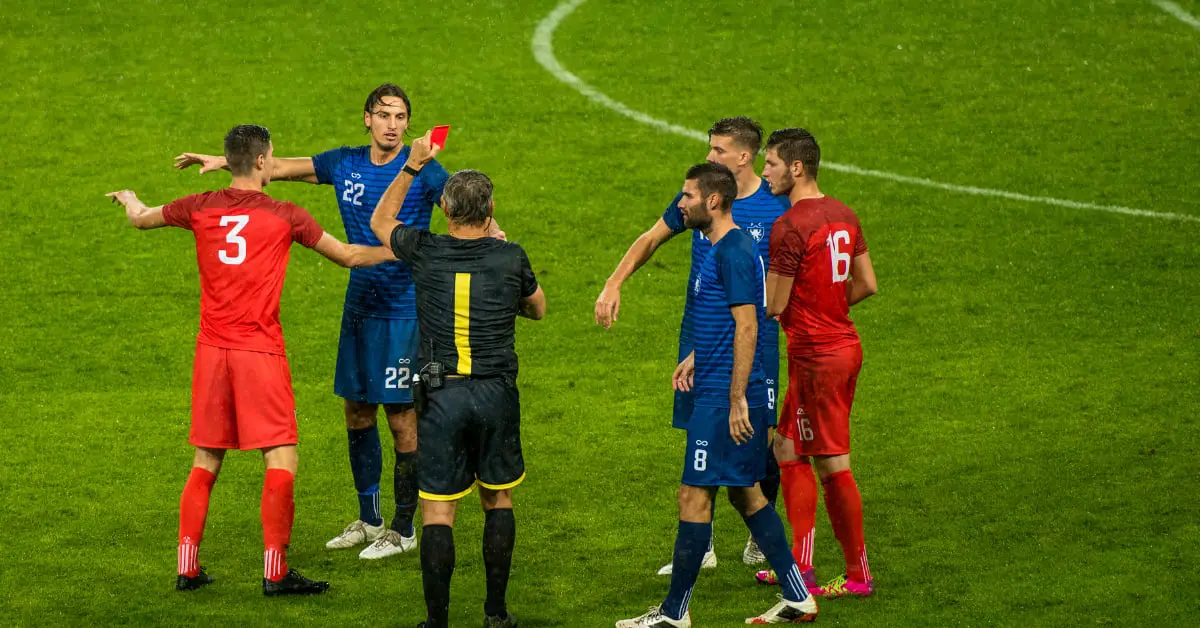The red card is one of the most controversial parts of the game of football. It’s a controversial decision that can have huge consequences for the player who receives it. It is also one of the hardest calls a referee has to make and has led to players having their careers ended because of this call. I’ll look at what a yellow card means in soccer. Also, what the potential consequences are for the player who receives it? I’ll also look at how referees try to get the best possible decision from the players.
What does a red card mean in soccer?
A red card is a penalty in soccer. It means that a player has been ejected from the game, and the team must play one man down for the rest of the match.
There are two types of red cards: a straight red and an indirect red, which is also called a second yellow card.
A straight red card is given when a player commits an offense that is so egregious that it cannot be ignored. The offense can be anything from violent conduct to dissent to serious foul play.
An indirect or second yellow card is given for unsporting behavior: dissent or persistent infringement of the rules, for example. A second yellow card results in a one-match ban for the offending player.
A straight red card is a serious matter, and the offending player will almost certainly be banned for at least one match. It’s possible that you may end up with more than one player being sent off in the same game.
If this is the case, then you will have to play with one less player for the duration of that match. The rules of football are designed to provide a fair and safe environment for all players, coaches, and spectators.
The referee is responsible for ensuring that the rules are followed at all times during play. If you have an issue with another player or coach, you should let the referee know so that they can deal with it accordingly.
Soccer Red Card Rules
- The red card is used to send a player off the field.
- A red card is given when a player commits a serious foul or handball, and it results in an opponent being injured.
- A player who receives a red card must leave the field immediately.
- If the illegal action is committed by both teams, the referee will give 2 cautions to each team.
- A red card can also be given if a player tries to hurt another player on purpose. Or if he/she spits on someone from another team after getting hit hard during play (this is known as “initiated contact”).
The 7 Offenses that lead to Red Card
In soccer, there are certain offenses that constitute a red card. A red card is a penalty that allows the referee to eject a player from the game. This can happen for a number of reasons, but here are the most common offenses:
Offense 1: Violent Conduct
Violent conduct is any action that threatens or causes physical harm to another person. Examples include punching, kicking, shoving, tackling, etc. This offense can also be used if there is an attempted or actual assault with a weapon.
Offense 2: Spitting at Another Player or Referee
Spitting at another player or referee is not only considered violent conduct. It’s also considered unsportsmanlike conduct and will result in an automatic red card.
Offense 3: Deliberately Attacking An Opponent With An Elbow To The Head Or Neck Area Of The Body
Deliberately attacking an opponent with an elbow can lead to serious injury or death. So this offense warrants immediate removal from the field of play. Elbows are considered dangerous weapons when used in this manner and should not be used as such under any circumstances!
Offense 4: Deliberately Attacking An Opponent With A Knee To The Face
Deliberately attacking an opponent with a knee to the head or face area of the body is considered violent conduct. And, this will result in an automatic red card.
Offense 5: Using offensive, insulting or abusive language and/or gestures:
Using offensive, insulting or abusive language and/or gestures are not permitted. If a player is guilty of this offense, he will be sent off the field and shown a red card.
Offense 6: Use of Insults, Threats, and Aggressive Behavior
A player who uses insults, threats, or aggressive behavior will be sent off and shown a red card. This includes players leaving the field to confront a referee or other official.
Offense 7: Intentionally Kicking A Ball At An Opponent’s Head Or Face
The ball cannot be intentionally kicked at an opponent’s head or face. If a player is guilty of this offense, he will be sent off the field and shown a red card.
The Consequences Of Red Card
There are many consequences of a red card. The most common consequence is suspension and fines.
Suspension
The suspension is the most severe consequence. If a player gets a red card, they will be suspended for the next match. It is important that players understand that this is not only a punishment for them but also for their team. The player who got the red card will not be allowed to participate in any kind of game until his or her suspension has passed.
Fine
If you get a red card in soccer, you’ll be ejected from the game and fined.
In most cases, you’ll receive this penalty if you commit a foul that is considered violent or dangerous by the referee. You might also get a red card if you commit an offense that results in an injury to another player.
The fine for getting a red card varies depending on the league’s rules. Some leagues also make players pay fines for yellow cards as well.
Can a goalie receive a red card?
It is possible for a goalie to receive a red card.
The goalie is the last line of defense, and they’re often the most important player on the field. With all eyes on them, it’s no surprise that they often receive a lot of contact. And, sometimes even a little extra attention from referees.
There are rules against goalies taking red cards, but these rules are rarely enforced. It can happen in certain circumstances:
If the goalie commits a serious offense
Or if they’re being targeted specifically by opposing players who are trying to get them off their game.
If the goalie commits a serious offense, they can be given a red card. This is usually when they’re guilty of handling outside their area or deliberately handling the ball to prevent an opponent from scoring.
If they’re being targeted, then a red card can be given. This usually happens when opposing players are trying to get the goalie off their game. For example, if a goalie is sent off for handling outside their area and an opponent gets away with a handball on the same play, it could be seen as retaliation against the goalkeeper.
What happens if a soccer team loses a goalie to a red card?
If a soccer team loses a goalie to a red card, there are several factors to consider.
First, the team’s ability to compete will be severely limited. If they have no other goalies on their roster, they will not be able to play the rest of that game and may need to forfeit.
Second, if they do have another goalie on their roster, they must decide whether or not they want to replace the injured player with this backup goalie. If they do replace him with this backup, then his replacement must be brought up to speed quickly so that he can effectively fill in for his new teammate.
Third, if this backup comes into play during the same game as his teammate was injured and does not perform well enough for them to win, then it may negatively affect how his teammates perceive him going forward.
How long does a red card last in soccer?
It depends on the type of red card.
In soccer, a player can get a red card for either committing a serious offense or receiving two yellow cards in the same game.
A red card can last anywhere from one to three games, depending on the severity of the offense.
For example, if you’re sent off for violent conduct or serious foul play that is, kicking an opponent or elbowing them, you’ll be out for three games. But if you’re sent off for a second yellow card in quick succession, your suspension will only be for one game.
The length of the suspension is decided by the referee and the competition. For example, in the Premier League, a player will receive a one-game ban for receiving two yellow cards in quick succession and a three-game ban if they receive a straight red card. So while it can vary, you’ll normally be out for one or two games after getting sent off in soccer.
Difference between yellow and red cards in soccer
Yellow and red cards are both used in soccer to penalize players for violating the rules of the game. They are different in a few ways, though.
Yellow cards are given to players who commit a minor offense that does not warrant a red card. The player who receives the yellow card is given a warning and must leave the field for two minutes. When he returns, he cannot participate in the game until his team has scored one goal or made three consecutive passes without interruption (whichever comes last).
Red cards are given to players who commit a serious offense that warrants ejection from the game. If you get a red card, you have to leave the field immediately and can’t come back until your team scores one goal or makes three consecutive passes without interruption (whichever comes first).
You can also get both yellow and red cards at once if you commit more than one offense!
Who has the reddest cards in their soccer career?
It’s hard to believe, but the soccer pro who has received the reddest cards in their career is none other than Gerardo Bedoya.
He has a lot of experience getting red cards. In fact, he holds the record for most red cards in a career! He’s earned 46 red cards over his career, which is far more than anyone else.
Bedoya was a Colombian soccer player who played for the Colombian national team and for several teams in Europe. He is best known for his time playing with Millonarios FC and Deportivo Cali.
Conclusion
A red card in soccer can mean a lot of different things. It can be a sign that the player is being violent or disrespectful, or it could be for a more serious infraction. The most important thing for players and coaches to remember is that any card carries with it potential consequences, both on and off the field. Whether it’s an early departure from the game or a suspension from next week’s match, every red card is something to be aware of.



